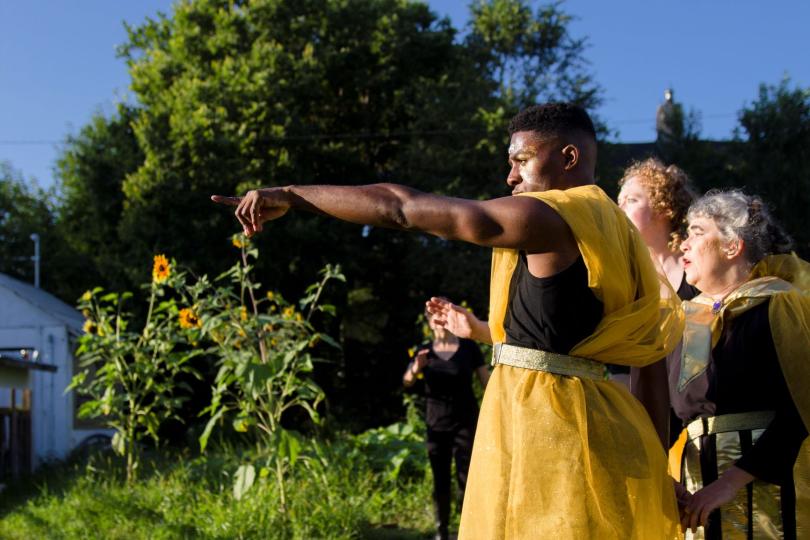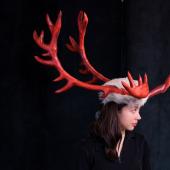The Show Must Not Go On

My quarantine began right before what would have been my tech week at In the Heart of the Beast Puppet & Mask Theatre. Within the span of a day, I went from a three-hour rehearsal to receiving notice that my show had been “postponed” to landing in the ER with symptoms of asthma exacerbation. Suddenly -- the same suddenly that came crashing into all of our realities -- instead of spending long evenings at the theatre tweaking lighting levels for a saber tooth mauling scene (yep -- y’all missed out), I found myself googling instructions for my new at-home nebulizer and coming to terms with my new pandemic identity: high risk.
My first week of self-isolation, I dedicated myself to one goal: get back to breathing normally. Turns out, it isn’t as easy as woo woo “breathe” memes suggest. It meant that everything about how I “handled things” needed to change. Principally, I could no longer allow my body to hold onto stress. Doing so -- particularly now -- could be life threatening. So, I actually had to sleep. Eat full, nutritious meals. Cut out caffeine. Cut out sugar. Cut out worrying.
And, as I was doing all these quiet, private daily rituals, I would get flashes of what I’d be doing if my show, my entire “business-as-usual,” hadn’t been cancelled:
-Shoveling an entire meal into my face in the five min of stress eating before rehearsal
-Staying up until 1am to respond to long threads of production questions
-Darting across Lake St for my third coffee at 4pm because I’d ignored all my other needs that day and just needed a little boost to get me through.
- Etc. etc. etc.
And honestly, despite the absolute heartbreak I felt for myself, for my fellow artists, for the world as a whole, a part of me also felt relief.
I didn’t have to run on burnout anymore.
This is the danger of equating busy-ness with success. Stress with legitimacy.
Self-neglect with professionalism. Theatre with business. This is the danger of not recognizing -- and reckoning with - -how ableist white colonial capitalistic structures have warped the practice of an art form that, at its origin, is community care.
Before I go any further, I’d just like to state the obvious: that I am far from the first person to make this critique or put forth visionary alternatives for how theatre as a force of healing can look. In the Twin Cities alone, I’ve been inspired by the work of Ananya Dance Theatre, FREE BLACK DIRT, Monkeybear Harmonic Workshop, Mother Goose’s Bedtime Stories, Queertopia, TruArtSpeaks, and 20% Theatre Company -- just to name a few. I will also point out that these are predominantly BIPOC and femme/nonbinary/trans led companies. This is absolutely not a coincidence.
When I think about what I hope comes out of this, it’s not that every theatre artist is Zoom-trained to intuit the most dramatic angles for their face, or make a compelling backdrop out of a doorway. I say that with total admiration for all the performers who are doing so right now: life is giving us rubbing alcohol and they’re making it into hand sanitizer. They’re showing the world how versatile and how necessary theatre artists are by meeting people where they’re at -- their homes (if they have the privilege of staying at home).
Taking a longer view, I don’t think the future of theatre is virtual but, it does need to be healthier. Not just for the audiences who attend, but for the artists who make it their life’s work. How can the process of making theatre itself become the remedy for what ails us, personally and collectively? How do we incorporate our lessons from this health crisis and slow down, listen more deeply, adjust expectations, and anticipate care? It may look like longer production timelines. It may look like shorter rehearsals. It may look like having snacks and children at every rehearsal. It will look like taking a hard look at what assumptions we have about “theatre” and really questioning where those come from. Which assumptions are based in our individual and collective artistic values, and which are replicas of the interlocking oppressive systems that we’ve been socialized into?
Just because I’m asking these questions doesn’t mean I have the answers. So instead of putting a tidy bow on this article (thanks for reading this far) I’d love to pass it off to you. What’s coming up for you right now? What lessons are you learning? What opportunities do you see in the present moment? If it moves you to share, I would love to hear your thoughts.




